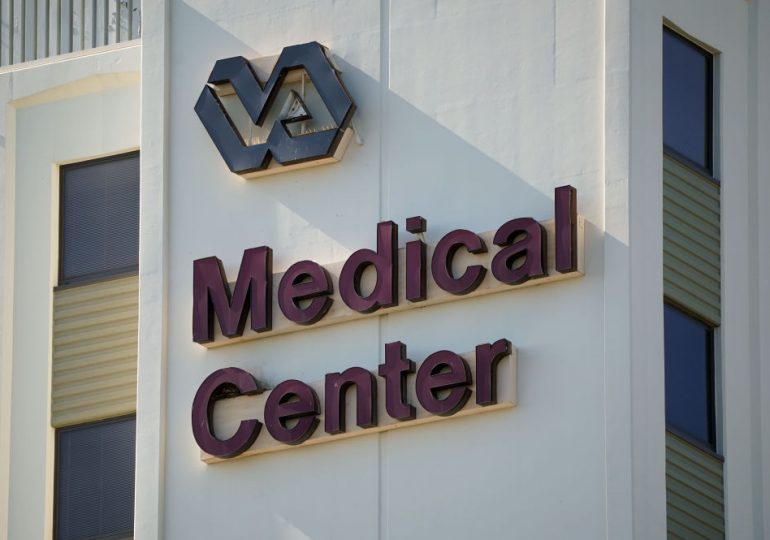Abortion rights advocates are concerned that the Trump Administration will reinstate an abortion ban at Department of Veterans Affairs (VA) medical facilities, rolling back the Biden Administration’s efforts to expand access for veterans and their beneficiaries.
Before the U.S. Supreme Court overturned Roe v. Wade, the VA had banned abortion under any circumstances and prohibited its medical providers from counseling patients about abortion. But after the court’s ruling in Dobbs v. Jackson Women’s Health Organization, the Biden Administration enacted a rule allowing VA medical facilities to offer abortion counseling and abortion care to veterans and their beneficiaries in certain situations, including if the health or life of the pregnant person is at risk or if the pregnancy was a result of rape or incest. Even if the VA facility is based in a state that has banned or restricted abortion, medical providers there can still provide abortion care in these limited instances.
[time-brightcove not-tgx=”true”]
Last month, the Trump Administration’s VA submitted for review an interim final rule regarding reproductive health services, according to the Office of Management and Budget’s Office of Information and Regulatory Affairs. There’s no further information or details on what the rule says. The VA did not respond to a request for comment, and the White House did not respond to a request for comment by press time. But abortion rights advocates fear that the rule will repeal the Biden-era policy, preventing veterans and their beneficiaries from obtaining abortion care at VA facilities across the country—both in states where abortion is legal and in those that have restricted it.
“If they fully rescind the rule, we would be going back to a complete ban on abortion for veterans through the [VA] health care system,” says Freya Riedlin, senior federal policy counsel at the Center for Reproductive Rights. “That was already bad before the Biden Administration, which added in these exceptions, but now we’re living in a completely different landscape.”
Twelve states have banned abortion in nearly all situations, and four have banned it after six weeks of pregnancy (which is before many people even know they’re pregnant). According to National Partnership for Women & Families, a nonprofit and nonpartisan advocacy organization, more than 55% of women veterans of reproductive age live in states that have banned or are likely to ban abortion.
“For some of those veterans in those states with bans, the VA is the only place where they are able to obtain abortion care in those states,” says Cassie Byard, a veteran and the communications manager for Minority Veterans of America. “If that current policy is rescinded, many who might need an abortion would be forced to travel to other states to reach a clinic.” That could lead to delays in care, or even force people to carry an unwanted pregnancy to term, she says, since the logistics of traveling out of state—cost, taking time off work, arranging childcare—are insurmountable for some people. For veterans who use the VA as their primary form of health care, going to a medical provider outside the VA would also incur out-of-pocket costs that may not be affordable, Byard says.
Read More: Title X Freeze Widely Threatens Health Care Access
According to Riedlin, if the VA rescinds the Biden-era policy in its entirety, it would represent the tightest restriction on abortion in the country. “In states that have total bans on abortion, generally, at least in writing, there’s some kind of a life [of the pregnant person] exception, even if it’s narrow,” she says. “We’ve seen that the narrow exceptions do not work—exceptions to abortion bans still have resulted in refusals of care that have threatened the lives and health of pregnant people. But if this rule is rescinded, even the pretense of leaving exceptions for the life of a veteran would not be there.”
The Biden Administration had also made efforts to help facilitate travel for active service members and their families to access reproductive health care services, including abortion. The policy allowed active service members and their families to take paid leave and get reimbursed for out-of-state travel to access abortion or other reproductive health care, such as in vitro fertilization (IVF), that was not available through the military. But soon after Pete Hegseth, President Donald Trump’s nominee to lead the Department of Defense (DoD), was confirmed, the department struck down that policy. A DoD official said in a statement shared with TIME that it’s the department’s policy “that taxpayer dollars shall not be used to fund, promote, or reimburse Service members or dependents for non-covered abortion-related travel expenses” and that rescinding the Biden-era rule was “consistent with these principles.” The official added that the new policy doesn’t prohibit active service members from accessing certain reproductive health care services not covered by the military health care program, such as IVF.
During Doug Collins’s confirmation hearing to be the VA Secretary, he was asked about the Biden-era VA policy on abortion. He claimed that a 1992 law bars the VA from providing abortion care, but said the VA would look at the Biden-era rule and “see if it complies with the law.” The Biden Administration had previously argued that a 1996 law allowing the VA to offer medical services determined to be “needed” can include abortion care.
“If they decide to roll back abortion access, it’s a total slap in the face to anybody who has served,” says Jackii Wang, senior legislative analyst at the National Women’s Law Center. “I’ve talked to a lot of veterans who tell me that they fought for all of our fundamental freedoms just to turn around and find out that those freedoms are being taken away from them.”
Byard calls the possible rollback a “cruel betrayal.” Fourteen years ago, when she gave birth to her son, she hemorrhaged. She says she also has an autoimmune disease that is not conducive to pregnancy, and so having more children could be dangerous for her health. While she says she was fortunate to have been able to get a tubal ligation outside of the VA to prevent her getting pregnant again (through employer-sponsored health care), that procedure is “not fool proof.” She now lives in Tennessee, which has banned abortion in nearly all circumstances.
Byard says abortion is a “human right,” and fears that other veterans at risk of pregnancy complications who live in states with bans or restrictions may not be able to receive care. She worries that a VA abortion ban will disproportionately affect people of color, people with disabilities, people who come from low-income households, and people in the LGBTQ+ community.
“Stripping away veterans’ access to reproductive health care is a betrayal of the sacrifice and service that folks have made to protect the rights and freedoms of everyone in this nation, and that is supposed to include them,” Byard says. “We should not be taking away rights from anyone.”
Leave a comment


